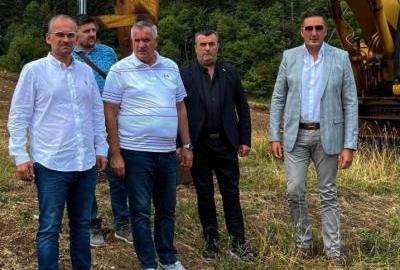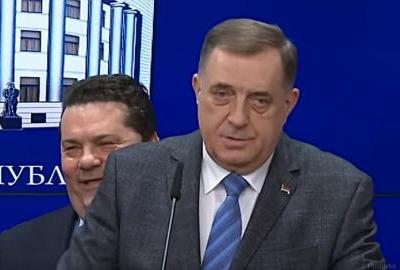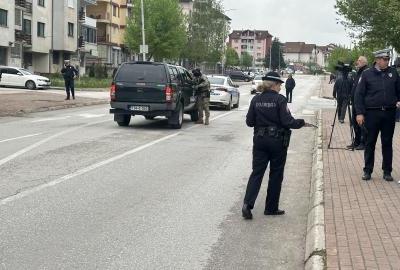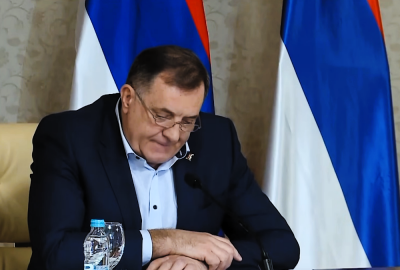Novosti
THE YEAR OF LESSENING RUSSIAN INFLUENCE: Stolen icon and a debacle of professional Russophiles
Several events have marked 2020, and optimists assess them as an indication of the reduction of “Russia’s soft power” in Bosnia and Herzegovina. These events are the change of the Central Election Commission’s members and the resignation of the President of the HJPC, Milan Tegeltija, but above all the result of the United States presidential elections, where Joe Biden won. However, it is wrong to think that these were the reasons why Russia has renounced its influence in the local affairs

The year 2020 came to an end like several previous ones, and again Russia took many things away from BiH, leaving nothing good behind.
The Russian Minister of Foreign Affairs, Sergey Lavrov, had only caused a new escalation of internal political conflicts with his visit in mid-December, and he took an invaluable, 300-year-old gilded icon, gifted to him by Milorad Dodik, to Moscow. This resulted in another problem for BiH, on an international scale, after Dodik’s office announced that the icon was found in Lugansk, the territory of Ukraine that Russian troops attempted to conquer and where conflicts took place. Ukraine then sent a diplomatic note seeking an explanation for how did this work of art, registered as their national heritage, come into Dodik’s possession.
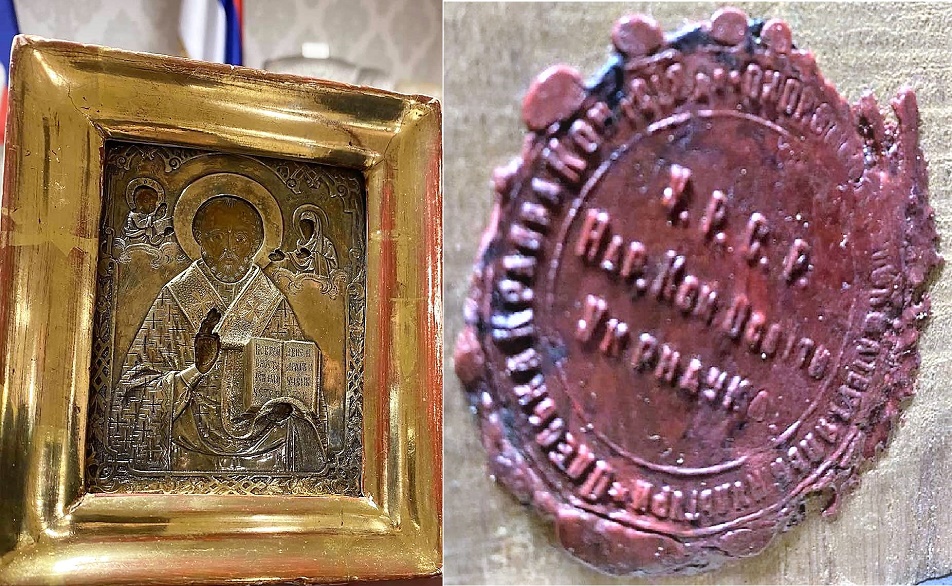
More than by the icon, which is now a matter for the investigation authorities, the BiH political scene was stirred by the decision of the two other members of the BiH Presidency, Šefik Džaferović and Željko Komšić, to cancel the meeting with Lavrov, scheduled for December 15, because he met with Dodik in Istočno Sarajevo the day before. There were no symbols of Bosnia and Herzegovina at that press conference , and Lavrov had delivered several controversial messages, ranging from the call for closure of the OHR to expressing the support for the Resolution on Military Neutrality adopted by the National Assembly of Republika Srpska, which actually means continuation of Russia’s involvement in the intended accession of Bosnia and Herzegovina to NATO Alliance.
“We do not accept that BiH has a Commission for NATO Integration. We express readiness to cooperate, but not to integrate. Republika Srpska does not see the benefits of integration with the NATO. The issue of our relationship is related to the positioning of Serbia and its military neutrality”, said Milorad Dodik on that occasion.
“The Russian Federation uses various instruments to pursue its political, propaganda and psychological interests in Bosnia and Herzegovina, as part of which it intervenes in Bosnia and Herzegovina’s internal affairs, and the focus is on weakening the state functionality and preventing it from joining NATO. It has the support of the authorities from Republika Srpska and SNSD’s MP Milorad Dodik, because Russia and RS are on the same wavelength. During the adoption of the BiH budget for 2020 in the House of Representatives of the BiH Parliament, the RS delegates jubilated that the financial resources promised on the basis of the Reform Program, which was sent to the NATO as an annual plan, were not approved. Apparently, such a scenario was written at the Russian Embassy in Sarajevo, and it had its “hand raisers” in the BiH Parliament,” said longtime journalist and geopolitical analyst Đuro Kozar for Žurnal.
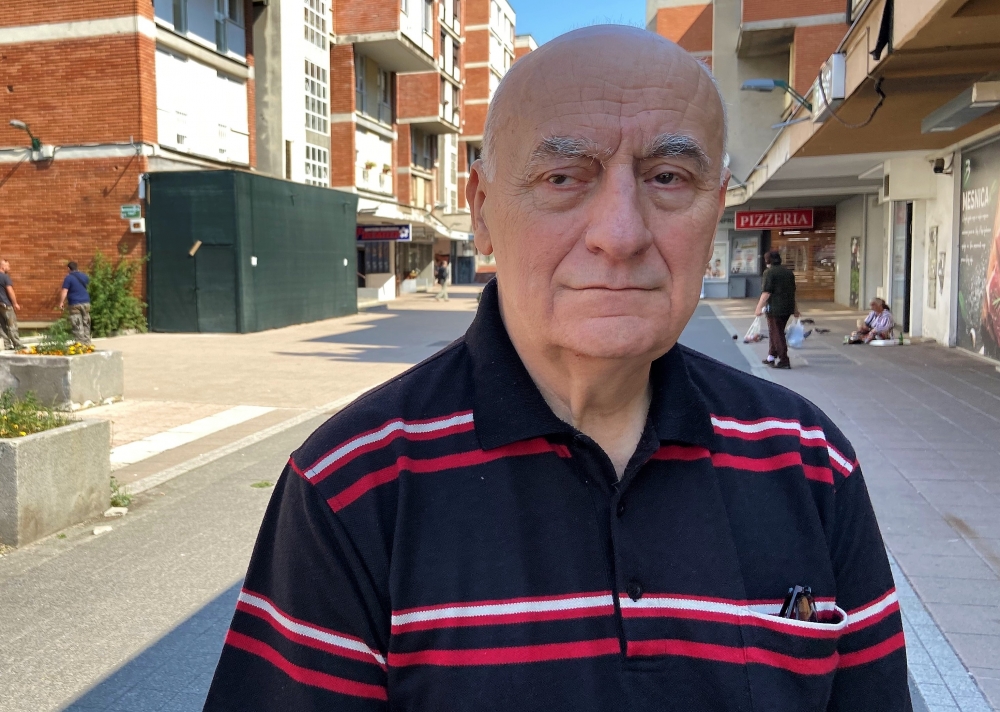 Đuro Kozar
Đuro Kozar
Milorad Dodik certainly needed Lavrov’s visit and the renewed public support for the abolition of the Office of the High Representative in Bosnia and Herzegovina. It was a “soothing salve on his wound” after he was forced to remove the plate with the name of war criminal Radovan Karadžić placed at the entrance to the Student Dormitory in Pale. Although he himself has been speaking insultingly and cynically about the OHR and the High Representative Valentin Inzko for a very long time, after the ultimate request Dodik felt that the international community’s teeth were “sharpened” for a moment, so the plate was removed at the alleged request of Karadžić’s daughter Sonja.
ABSOLUTE MONOPOLY
Right after Sergey Lavrov left BiH, a notification came from Russia, more precisely from their company Gazprom, that they will reduce the agreed quantity of gas supply to Bosnia and Herzegovina by half. After a few hours, that decision was withdrawn, and everything was justified by alleged technical problems, but there is no doubt that this was a kind of a subtle message to BiH demonstrating what Russia is capable of.
“I must admit that they are doing it quite well since it is a country that is very poor. A country of countless gas stations, professors’ salaries of 400 Euro, dusty roads that from October still turn into so-called “Rasputitsa”, i.e. into mud that is impossible to go through. They do not have the prospect for a genuine political democracy, but rather for the so-called “managed democracy”, because their president says that Western democracy is not for Russians. It successfully conceals this basic problem because it depends on the sale of oil and gas and projects its budget based on the price of a barrel of oil on the market, and it is an area that is very unstable, deceptive and unpredictable. The sale of weapons cannot fill every segment of the country’s operations and survival. The only thing left is oil, gas and tactical blackmail about their transport”, said sociologist Sead Pašić for Žurnal.
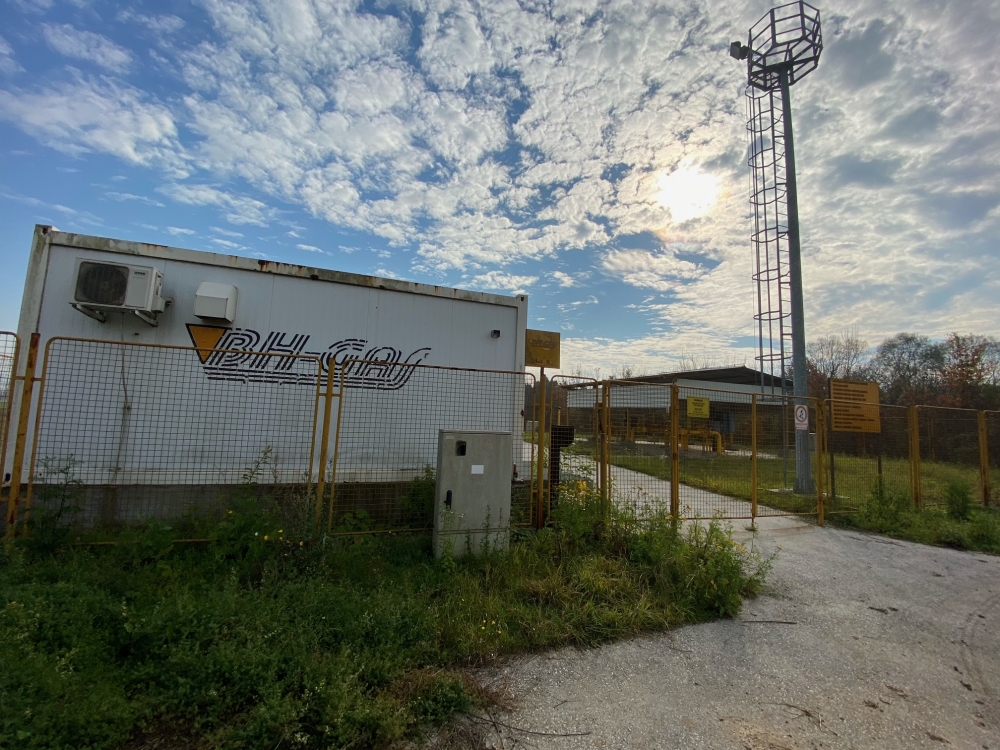
Russia has an absolute monopoly on the BiH gas market. The only supplier of natural gas is the Russian Gazprom. The government in Republika Srpska, read Milorad Dodik, is the guardian of Russian interests here too, because they do not allow the legislation on gas to be at the state level. When it comes to the import of crude oil, as much as 98% is imported from Russia. Truth be told, 57% of the imports of refined oil and petroleum products are from Croatia, but through the ownership structures the operations of INA and the Hungarian MOL still largely depend on Russia.
Žurnal wrote that one of the first moves of Milorad Dodik after regaining power in Republika Srpska in 2006 was to amend the Law on Privatization of State-Owned Capital. The reason of such an action becomes known very soon. A protocol on sale of Republika Srpska’s petroleum industry was signed. Oil Refineries in Brod and Modriča and distribution company Petrol were sold in February 2007 for 236 million KM to the Russian company NeftGazinKor. NeftGazinKor established company Optima Group in 2008 in Banja Luka to control the entry and the exit of crude oil and other goods. Majority of the contractual obligations have not been observed, while the losses are increasing. The total debt of two refineries and Nestro Petrol has exceeded 800 million KM! However, there are grounds for suspicion that profit is leaving for Russia, and that debts remain in Bosnia and Herzegovina.
“The local population does not really benefit from that country because it does not provide economic assistance, there are no lucrative contracts with Russian companies, there is no partnership in the most important segment, and that is banking. They either export or gift old, Soviet technologies or open centers for “humanitarian” training of something, and that something is always an ear and an eye in the field, which is, to be honest, not very interesting to them. Strategically they would not know what to do with it even if someone would give it to them, but it is important for them to constantly make political obstruction, economic disruption, to create a sense of insecurity and political “slipperiness”, namely they lack any concept of the future for these countries, which can only expect to constantly look over their shoulders if they do not enter into an alliance with Russia,” concludes Sead Pašić.
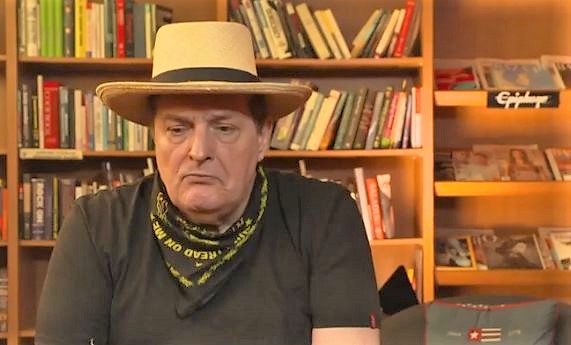 Sead Pašić
Sead Pašić
Janusz Bugajski, a Senior Fellow at the Center for European Policy Analysis (CEPA) in Washington DC, wrote a text for Žurnal claiming that the status of Moscow’s geopolitical hostage in the Balkans was projected on Bosnia and Herzegovina.
“Vladimir Putin’s Kremlin has developed an extensive array of tools in pursuing its anti-Western offensive and several are now deployed in the Western Balkans to maintain Bosnia and Herzegovina as a frozen state with an unresolved internal conflict that can be incited to Russia’s advantage. Western leaders seek stability and security in the Western Balkans even while viewing several states as unprepared for EU membership. In stark contrast, Moscow fosters instability and insecurity, as this helps achieve four major goals”, wrote Bugajski.
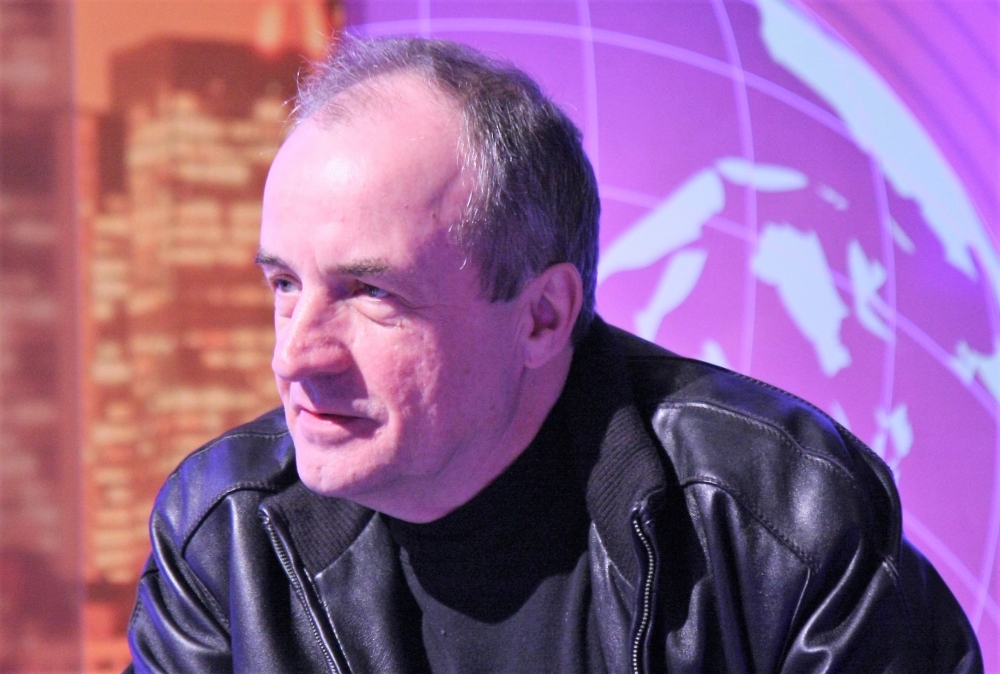 Janusz Bugajski
Janusz Bugajski
These goals are to expand Russia’s geopolitical reach, to fracture Western cohesion, to remove the US presence in the Balkans, and to seek Balkan allies or supplicants.
SECRET MEETINGS
The leader of HDZ BiH, Dragan Čović, “registered” himself amongst the most faithful supplicants of the Russian politics. It was revealed that he and the former vice president of HDZ Croatia, Milijan Vaso Brkić, had held secret meetings with Nikolai Patrushev, former Director of the Russian Federal Security Service, and Secretary of the Security Council of Russia, where, on the eve of the 2018 General Elections in BiH, they were agreeing a strategy for getting Čović the position of a member of the BiH Presidency. Their plans were thwarted by the candidacy of Željko Komšić.
The outgoing ambassador of the Russian Federation to BiH, Petr Ivancov, has supported Čović since his coalition with Dodik became official. Ivancov had openly, undiplomatically, supported the advocated secessionism of Republika Srpska.
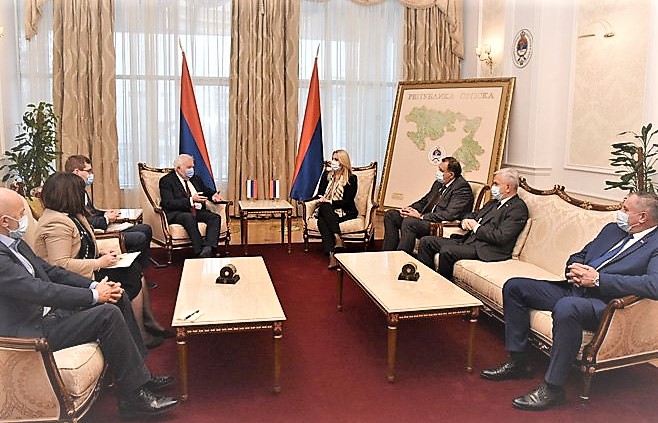
Ivancov had regular contacts with the Central Election Commission at the time. But, the commission lost the “Russian favorites” at the beginning of the year, same as the BiH judiciary scene was abandoned by yet another “welcomed guest” at the conferences in Russia, Milan Tegeltija, since recently, the former President of the High Judicial and Prosecutorial Council.
 Milan Tegeltija (right on the picture) in Sochi
Milan Tegeltija (right on the picture) in Sochi
The institution that hosted the President of the HJPC Milan Tegeltija in Russia in 2018 and 2019, having “the interests of the citizens and the state of Bosnia and Herzegovina in mind”, has been unofficially registered as an aide of the Main Intelligence Administration of Russia (GRU)! Both conferences were organized by FSSP - “Federal Bailiffs Service of the Russian Federation” (Федеральная служба судебных приставов). Žurnal had described in detail the genesis and the background of the operations of this institution, which is in essence just another Vladimir Putin’s “baby” for intelligence activities and dealing with opponents of his politics.
RELIGIOUS AND CULTURAL TIES
Russia has not neglected a seemingly peripheral, but continuously effective model of infiltration in Bosnia and Herzegovina and the realization of its influence. It took place with the help of “brothers” from Serbia and by maintaining religious and cultural ties with the region through the Russian and Serbian Orthodox Churches. Acting with greater or lesser intensity, these associations rely on the Serbian Orthodox Church and Orthodoxy as a link to Russia. In their field activities they mention the cooperation of two countries: Russia and Republika Srpska!?
The most famous is the organization “Night Wolves”, one of those on the US “black list”. Publicly they are promoters of peace and brotherhood amongst the people, whilst in the background they are actually recruitment base for the paramilitary formations in Donbas. Even Milorad Dodik could not “resist” them as they enjoy support of the Russia’s President Vladimir Putin.
 Milorad Dodik with "Night wolves"
Milorad Dodik with "Night wolves"
“Russia remains a significant player in the Balkans with the goal of preventing the Europeanization of the southeast of the continent and the NATO integration of those countries. Once this is done, it can dedicate itself to rebuilding of the USSR, the Empire or anything, as long as it is big, strong, commanding and managing people, resources and the country... The Russian Church and the President are like twins on that path. They never separate, they all work together, they look and think alike,” concludes Sead Pašić.
Several events have marked 2020, and optimists assess them as an indication of the reduction of “Russia’s soft power” in Bosnia and Herzegovina. These are the change of the Central Election Commission’s members and the resignation of the President of the HJPC, Milan Tegeltija, but above all the result of the United States presidential elections, where Joe Biden won. However, it is wrong to think that these were the reasons why Russia has renounced its influence in the local affairs.
Neither did the Serbian President Aleksandar Vučić nor particularly Milorad Dodik hide their disappointment and concern over the victory. They reminded that Biden had long ago characterized Slobodan Milošević as a criminal, that he supported the NATO intervention in 1999, as well as the independence of Kosovo.
Biden’s message on the occasion of the 25th anniversary of the signing of the Dayton Peace Agreement indicated that BiH would again become one of the priorities of American foreign policy.
“Yet, a quarter century later, it is clear that the work to promote justice, reconciliation, and a functional, multi-ethnic Bosnia and Herzegovina remains incomplete. Too often, we have seen nationalism win out over national interest and the enrichment of a few coming before reforms to benefit the many. This anniversary is an occasion for all the parties to reflect on the possibility of a brighter future and to recommit to the difficult but necessary steps to build a fully-functioning Bosnia and Herzegovina for all its citizens,” said Biden.
According to the local analysts, his words have already been understood as an undisguised support for the whole BiH, which could mean the beginning of the end of Milorad Dodik’s secessionism or his political career and if not the end, then the absolute minimization of Russian influence in Bosnia and Herzegovina. Dragan Čović was among the first from BiH to congratulate Biden on his victory.
Dodik did not publicly criticize him for that, but shortly afterwards, SNSD members in Canton 10 - Livno demanded a change of the cantonal symbols with “chequerboard pattern” and an end to the use of the unconstitutional name “Herzeg-Bosnia Canton”.
DISCUSSION WITH BIDEN
Dodik was, just like Aleksandar Vučić, amongst the last to congratulate Biden. In addition to few courteous congratulatory sentences, he devoted the rest of the message to completely ridiculous details, arguing with Biden about the celebration of Statehood Day in BiH and the non-existence of the Law on Holidays!?
“Bosnia is interesting. The United States created the framework of Bosnia in the 1990s, and Dayton was a necessity. Now everyone knows that this framework needs to be corrected in order for Bosnia to be more functional, and that is where American engagement is crucial. Of course, the main obstacle is Dodik. It is clear that Dodik is not functioning independently, and that any pressure of the West on Dodik would mean the pressure on Vučić. That is why the President of Serbia could find himself under the same pressure as Milošević had in the 1990s during the time of Holbrooke and Clinton. The offers on the table then were - either give up Karadžić and Mladić or you lose the support of the United States. History could repeat itself, so that Vučić would be forced to choose between Dodik and the support of the USA”, said Gennadiy Sysoyev, geopolitical analyst and correspondent of the Russian Kommersant for the Western Balkans, for the crnogorskiportal.me.
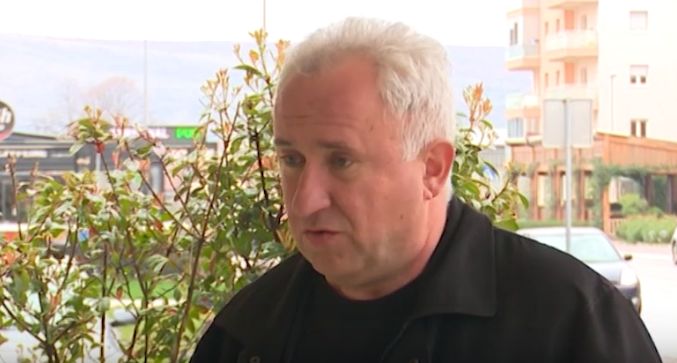 Gennadiy Sysoyev
Gennadiy Sysoyev
Just as Moscow trusts Vučić less than Dodik because he “maneuvers” in relations with Russia, the European Union and the United States, so Vučić does not trust Dodik. He certainly does not forget Dodik’s servility towards all previous presidents of Serbia, regardless of political affiliation, as well as some of Dodik’s statements about him and his party.
“The elections have shown that they are marginal political figures, a failure, a failure at the elections,” spoke Dodik of Serbian Progressive Party in 2002 when Boris Tadić was elected president of Serbia.
Even during the pandemic, Dodik does not fail to “push” Russian products as well as to glorify its medicine neglecting thereat expert opinions. So following Lavrov’s visit he said that he will take the Russian vaccine against the coronavirus because there are some speculations that “Western” vaccines “cause sterility”!?
At the same time Dodik may be deliberately ignoring the issue of population’s health, but also the fact that the Republika Srpska, through the Council of Ministers of BiH, has already made a reservation with the Global Vaccine Alliance (GAVI) for the procurement of vaccines that do not have to be Russian at all!
“He wants to present himself as a key Russian player in the field, as the one who points out certain things, has information from the Russian side, and plays a key role in a global battle that is going on in BiH and Serbia. Russia is close to us, it loves us, we are Russian players. It is a play for the public that serves him primarily”, believes political analysts Adnan Huskić.
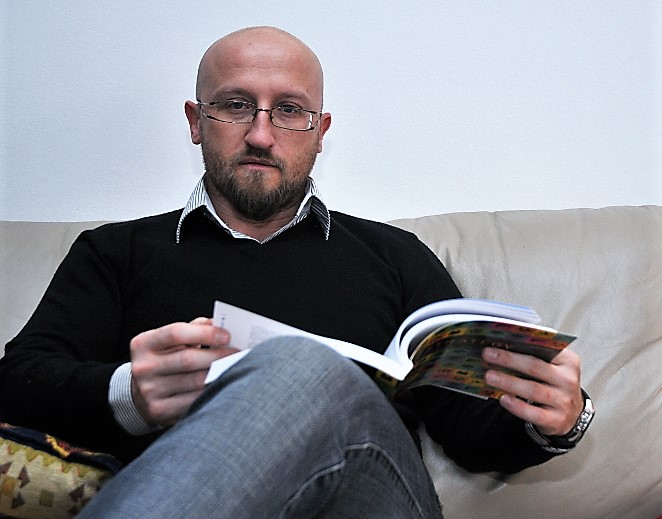
Of course, even if Republika Srpska would opt for Russian vaccines on Dodik’s order, they would not be, in accordance with “fraternal ties”, cheaper, and particularly not of a charity nature. An old and proven thesis that Russia wants to have influence in Bosnia and Herzegovina, but not at its own expense, was shown by the analysis of the value of humanitarian aid delivered to Bosnia and Herzegovina during the first four months after the virus outbreak. The European Union and the United States have, so to say, saved BiH from serious consequences.
Dodik’s media supplicants had in vain glorified every small package from Russia, when the RS government had to provide aircraft fuel for the transport of the team that “watered” this entity with “deadly disinfectant” whereafter the epidemic escalated...
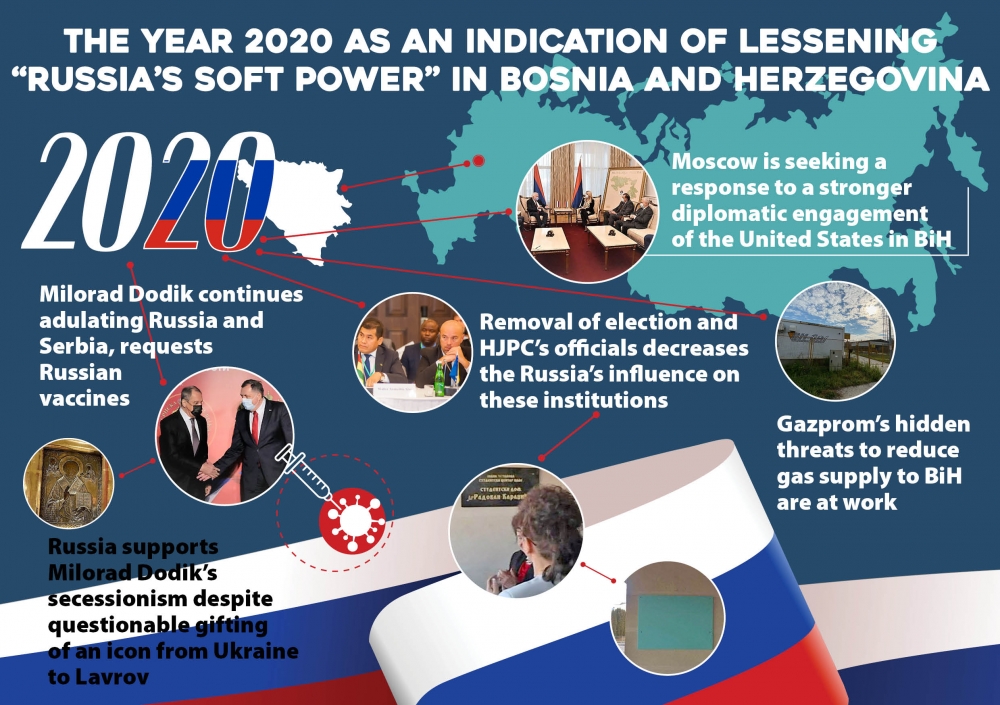
(zurnal.info)





